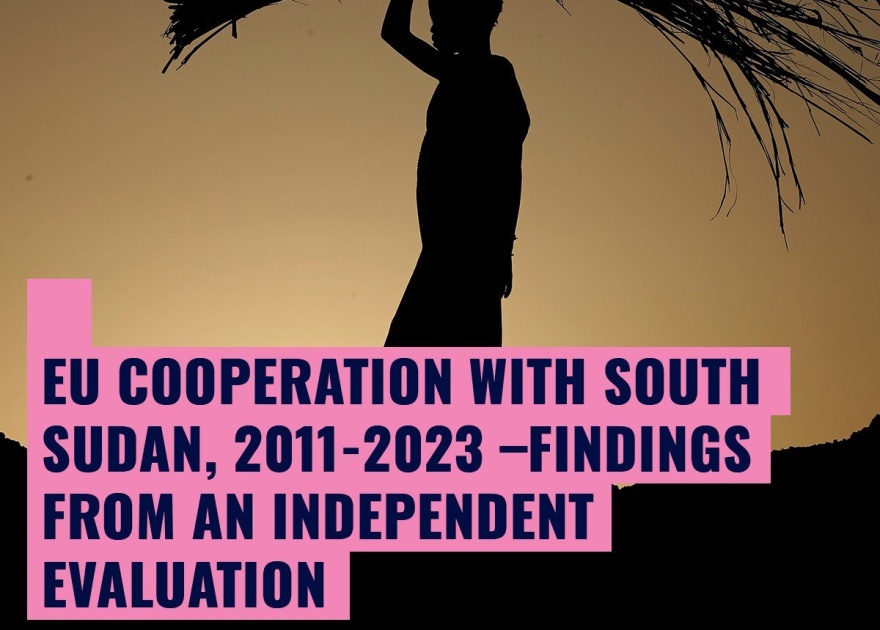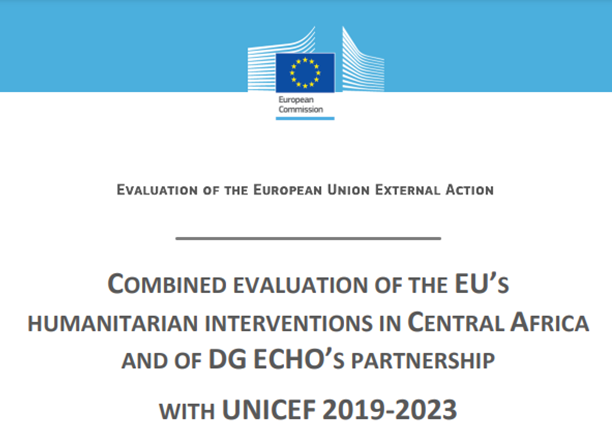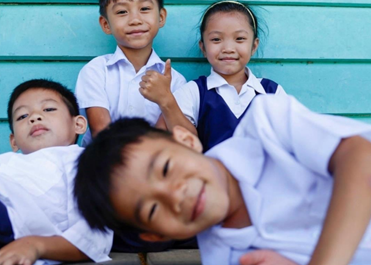World Humanitarian Day 2019: Landell Mills’ highlights experience in evaluating DG ECHO’s humanitarian operations
On World Humanitarian Day 2019, Landell Mills is highlighting our continued work in conducting independent evaluations for the European Commission's Directorate-General for European Civil Protection and Humanitarian Aid Operations (DG ECHO). DG ECHO been providing assistance in response to disasters and humanitarian emergencies since 1992, with an annual humanitarian budget of just over €1 billion. Evaluations are an essential part of the EC's decision making process, and their conclusions and recommendations contribute to DG ECHO's strategic planning, programming and budgetary cycle.
Find out more about the various humanitarian operations evaluations our Monitoring, Evaluations and Learning Division has been delivering since 2018 for DG ECHO's operations in humanitarian logistics and in countries including Afghanistan, Turkey, Central Africa and Ukraine:

In a disaster context, it is essential to ensure efficient and effective delivery, so that assistance reaches the people affected by the emergency as rapidly as possible. For this evaluation, humanitarian logistics included 'the processes and systems involved in mobilising people, resources, skills and knowledge to help vulnerable people affected by natural disasters and complex emergencies'. Transport and logistics are a major cost driver to human organisations and can be as high as 40-60% of their overall budget. When operations involve the provision of food assistance or in the initial phase of an emergency response to a rapid onset disaster, this can reach 80% of the total costs. Therefore, improvements in terms of cost and efficiency can result in significant savings and enhance programme delivery (e.g. increased speed, quality of relief items, goods tracking and Humanitarian Supply Chain performance reporting).
This evaluation covered DG ECHO investments in humanitarian air services, in initiatives to improve systems for humanitarian logistics, and funding to the logistics elements of DG ECHO projects. It found that investments in the period 2008-13 in logistics hubs, logistics training and support to the development of the Global Logistics Cluster all had lasting benefits, and that support to air services remains highly relevant. The report documents the key challenges facing humanitarian logistics and proposes actions for DG ECHO's consideration of how the organisation can exercise further leadership in the realm of logistics, working collaboratively with other humanitarian actors to achieve efficiencies and improve results for beneficiaries of humanitarian action.
Combined evaluation of the European Union's humanitarian interventions in Afghanistan 2014-2018 and DG ECHO's partnership with the Norwegian Refugee Council (ongoing)
DG ECHO is a major humanitarian donor to actions in Afghanistan, a country in a situation of protracted conflict in which the security situation has been rapidly deteriorating since the withdrawal of international troops in 2014. In addition, Afghanistan is highly vulnerable to natural disasters and climate-related shocks. The Humanitarian Response Plan (December 2018) records as many as 6.3 million people in need of humanitarian aid in 2019. One strand of this combined evaluation focused on DG ECHO's humanitarian actions in Afghanistan for the period 2014-2018, and provides an assessment of performance, challenges to delivery of assistance and protection to people affected by conflict and disasters, and to identify lessons and good practices.
The second strand of the evaluation provides an assessment of DG ECHO's partnership with the Norwegian Refugee Council (NRC) globally during the period 2014-2018. This partnership is significant to both organisations; during the evaluation period, the total value of DG ECHO funding to NRC was approximately €278 million. For NRC, DG ECHO is the second largest donor, providing 18% of its funding in 2017. The evaluation focuses on identifying lessons learned and good practice, for the benefit of this partnership and DG ECHO's overall partnership framework.
Evaluation of the European Union's Humanitarian Response to the refugee crisis in Turkey, 2016-2017
Turkey hosts more than 3.5 million refugees displaced by the conflict in Syria, which has now entered its ninth year. The European Union is the world's largest humanitarian donor responding to this protracted crisis. In partnership with Universalia, Landell Mills has recently completed an evaluation of the EU's humanitarian response in Turkey during 2016 and 2017, support which totalled EUR 1.4 billion. Humanitarian partners implemented 45 EU-funded projects during this period, in the sectors of basic needs, protection, health and education. Among these projects is the 'Emergency Social Safety Net' (ESSN) programme, which provides debit card cash transfers to the most vulnerable refugee families in Syria and is thought to be the largest single humanitarian programme in history.
The evaluation used a combination of research methods, including qualitative primary data collection (key informant interviews, focus group discussions with refugees, workshops with EU and partner staff, an online survey and field observations) and secondary data analysis (from document review, stakeholder mapping and existing quantitative data sets). Fieldwork was carried out in the 10 provinces of Turkey hosting the greatest number of refugees. The evaluation will be key to informing the EU's continued support to refugees in Turkey, and also makes recommendations on an exit strategy and transition from humanitarian response to development assistance.
Evaluation of the EU's humanitarian assistance in the Central Africa region, including humanitarian coordination, 2014-2018
The purpose of this evaluation is to provide a retrospective assessment of DG ECHO's interventions in the Central African region, to help shape the EU's future approach. The team has been conducting an independent evaluation of the EU's humanitarian response in The Central African Republic, Chad and Cameroon between 2014 and 2018. It has two main components: a geographical coverage focusing on DG ECHO's interventions Chad, Cameroon and CAR; and a thematic aspect, focusing on Humanitarian Coordination in the region, including a global portfolio analysis of funded actions.
In this period, the Central Africa region suffered multiple humanitarian crises with largescale impact. The region's multiple crises may be attributed in part to three key drivers: CAR's conflict and protection crisis; Boko Haram-related violence in Nigeria and Lake Chad; and structural food insecurity in the Sahel regions of Chad and Cameroon. However, the region has also hosted protracted refugee populations from Sudan's Darfur crisis, faced risks associated with natural hazards and public health epidemics, and contended with emerging risks from the 'Anglophone crisis' in Cameroon. This combination of factors has led to increasing numbers of people in need of humanitarian assistance, with 10.2 million in need by 2018 (GHO, 2018). However, the Central Africa region is considered to be affected by 'forgotten crisis' and therefore receives relatively low levels of funding from global donors. With DG ECHO a key actor in the region, and in funding global coordination actions more widely, this evaluation analyses its assistance and draws out lessons learned to strengthen future humanitarian strategy.
Evaluation of European Union's humanitarian assistance in Ukraine, 2014-2018
The armed conflict in eastern Ukraine between pro-Russian separatists, who control parts of Donetsk and Luhansk, and the Government of Ukraine entered its sixth year in 2019. This ongoing conflict and failing peace process has had serious humanitarian consequences for millions of people in these areas since 2014. The European Union has been the second largest international donor to respond to this crisis, providing food assistance, healthcare, shelter and other non-food items to people in need in both government-controlled and non-government controlled areas. Landell Mills and Universalia were recently awarded a contract to deliver an evaluation of the EU's humanitarian assistance in Ukraine between 2014 and 2018. The evaluation will provide a retrospective assessment of EU interventions in Ukraine, which should help to shape the EU's future humanitarian approach in the country and provide strategic recommendations on how to strengthen the humanitarian-development nexus, build resilience and transition towards long-term solutions.


